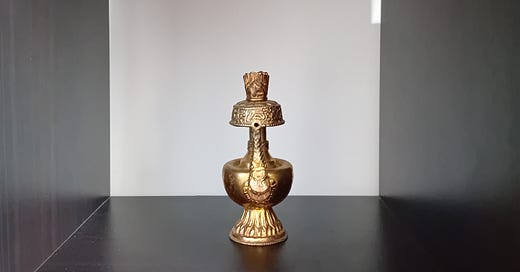This morning, while waiting for the coffee to steep, I prostrated before the shrine, before the holy objects on the shrine—the representation of the body, speech and mind of the Buddha—and felt, as I have for many months now, hollowness in reciting the prayers, the renewal of our primary vows, instead of the soft presence of devotion. I felt hollow, pressing my forehead to the ground, and hollow reciting the bodhicitta prayers, the prayers of lovingkindness, which is an active principle.
May all mother sentient beings have happiness and the causes of happiness.
May they be free of suffering and the causes of suffering.
May they have happiness that knows no suffering.
May they abide in equanimity, undisturbed by the sufferings of life.
I could not concentrate on the Refuge Tree, nor the Field of Merit and Accumulation because my mind was full of last night’s dreams: body parts I was helping to gather up into trash bags; pleas for help in Arabic, shrieked by children lost in dust and darkness; the deadly flight of the zanana. I prayed the seven limbs and, when I reached confession, I admit, I faltered. I have been plagued by the silence in the sangha, which is not unusual, in the west or the east. Our faith has a tendency to veer towards the apolitical, though our tradition also has its Aaron Bushnell’s. Have we, in the Tibetan traditions, forgotten the wave of self-immolations across occupied Tibet following the 2008 Olympics, and its attenuating wave of oppression? H.H. XIV Dalai Lama and Daw Aung Saan Suu Kyi were once our beloved Nobel Laureates; today I hear none of our voices calling for a ceasefire. I hear no one in our communities condemning or speaking out against Daw Aung Suu Kyi’s support of the Rohingya Genocide.
Every vow we take, we take with body, speech and mind, and we renew them daily—body, let us remember, is action. That which we do with our bodies. We cannot think peace, cannot think “may there be an end to all suffering, including that of the people in Palestine and Congo and Yemen”, cannot repeat such placid thoughts and prayers, and then pass off further engagement of crimes against humanity with speeches about the Middle Way, or emptiness or karma or the usual ways in which discussion of how to confront injustice is derailed and taken off the table.
Prayer is hollow when it is held up as the appropriate response to holocaust.
Reflecting on emptiness when families are being wiped out is not abiding by the Dharma, it is callous and nihilistic. Counselling the Middle Way as every university, mosque and hospital in Gaza is being erased seems to me a renunciation of the Bodhisattva vow, and all Root Vajrayana Samaya.
Prayer is not enough in the face of tragedy. Every one of us who comes from a faith tradition, who comes from a prayer tradition knows that rolling up one’s sleeves and putting one’s body into holy work is far more powerful than all our candles and chants and bells and silence. Raising our voices in holy advocacy is greater merit than 1,000 Nyung Ne fasts.
The Dharma, as an institution has been able to make itself useful to empires, and thus to ensure its survival over the last two and a half millennia. All institutions are liable to corruption, it’s inevitable, and one of the gravest corruptions in our shared Dharma institutions is a culture of silence in the face of the gravest crimes humans can commit against fellow humans. It is a culture of silence out of deference to power.
Now, the questions:
What is on your mind these last seven months as you bring your hands together in front of the holy objects of refuge?
What is on your mind when you reach the third of the seven limbs, confession?
Where is Palestine in your Field of Accumulation?
When does equanimity require rocking the boat so that all may rest there, in a place beyond extremes?
When does the need for holy speech and holy action, motivated by holy outrage, become important? Do you expect the Dharmapalas to act alone?
Will our communities remain silent, offering no resistance, offering only prayer?
Can you live with yourself and your practice if your second of the seven limbs, offering, is an offering of silence when we can, potentially, make the offering of saving lives, another ritual practice we celebrate? Can we not put ourselves to the saving of human lives instead of the fish we buy in markets and release into rivers and lakes?
The keeping of ritual, the keeping of the calendar, the holy days, the feast days seems illusion, seems illusory knowing the moon by which we mark our months is obscured by smoke and white phosphorous for those in Palestine who also measure prayer, who also measure time between holy days by following the moon. They have completed Ramadan as we look towards Saga Dawa, if we take no other stand, can the Nyung Ne’s fast of Saga Dawa be dedicated to Palestine, if that is all we have to offer, thoughts and prayers? Can we at least make that gesture, if we are willing to make no other, if we are unwilling to offer our bodies and voices in any other way?
If you must maintain your silence, if you must protect your precious Middle Way, please, I implore you, offer your dedications, for the rest of your life to those on the altar of human dignity, being sacrificed every hour in the charnel grounds of Gaza, and then make confession for having broken your vows.




